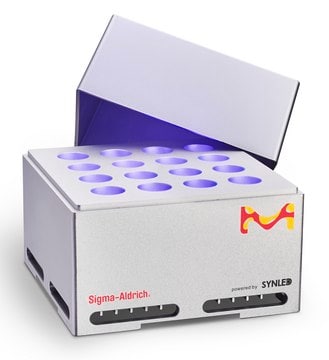All Photos(2)
About This Item
Linear Formula:
C6H5NHC6H4NO2
CAS Number:
Molecular Weight:
214.22
EC Number:
MDL number:
UNSPSC Code:
12352100
eCl@ss:
39032032
PubChem Substance ID:
NACRES:
NA.22
Recommended Products
Assay
99%
form
solid
mp
132-135 °C (lit.)
SMILES string
[O-][N+](=O)c1ccc(Nc2ccccc2)cc1
InChI
1S/C12H10N2O2/c15-14(16)12-8-6-11(7-9-12)13-10-4-2-1-3-5-10/h1-9,13H
InChI key
XXYMSQQCBUKFHE-UHFFFAOYSA-N
Related Categories
General description
4-Nitrodiphenylamine undergoes heterogeneous catalytic transfer hydrogenation to form p-phenylenediamines. 4-Nitrodiphenylamine is used as stabilizer for propellants and explosives.
Application
4-Nitrodiphenylamine was used to study reduction of nitrated diphenylamine derivatives in sediment water batch enrichments and dense cell suspensions of anaerobic, aromatic-compound-mineralizing pure bacterial cultures.
Signal Word
Warning
Hazard Statements
Precautionary Statements
Hazard Classifications
Eye Irrit. 2 - Skin Irrit. 2 - STOT SE 3
Target Organs
Respiratory system
Storage Class Code
11 - Combustible Solids
WGK
WGK 3
Flash Point(F)
Not applicable
Flash Point(C)
Not applicable
Personal Protective Equipment
dust mask type N95 (US), Eyeshields, Gloves
Certificates of Analysis (COA)
Search for Certificates of Analysis (COA) by entering the products Lot/Batch Number. Lot and Batch Numbers can be found on a product’s label following the words ‘Lot’ or ‘Batch’.
Already Own This Product?
Find documentation for the products that you have recently purchased in the Document Library.
Heterogeneous catalytic transfer hydrogenation of 4-nitrodiphenylamine to p-phenylenediamines.
Banerjee AA and Mukesh D.
Journal of the Chemical Society. Chemical Communications, 18, 1275-1276 (1988)
Anne-Laure Gassner et al.
Science & justice : journal of the Forensic Science Society, 60(2), 136-144 (2020-03-01)
The present study investigated the organic gunshot residue (OGSR) background level of police vehicles in Switzerland. Specimens from 64 vehicles belonging to two regional police services were collected and analysed by LC-MS in positive mode. The driver's and back seats
O Drzyzga et al.
Applied and environmental microbiology, 61(9), 3282-3287 (1995-09-01)
2-Nitrodiphenylamine, 4-nitrodiphenylamine, and 2,4-dinitrodiphenylamine were anaerobically metabolized in sediment-water batch enrichments inoculated with mud from the German North Sea coast. The first intermediate in 2,4-dinitrodiphenylamine degradation was 2-amino-4-nitrodiphenylamine, which appeared in large (nearly stoichiometric) amounts before being completely reduced to
Anne-Laure Gassner et al.
Science & justice : journal of the Forensic Science Society, 59(1), 58-66 (2019-01-19)
The present study aimed at providing data to assess the secondary transfer of organic gunshot residues (OGSR). Three scenarios were evaluated in controlled conditions, namely displacing a firearm from point A to point B, a simple handshake and an arrest
Zuriñe Abrego et al.
The Analyst, 139(23), 6232-6241 (2014-10-11)
A method based on scanning laser ablation and inductively coupled plasma-mass spectrometry (SLA-ICPMS) and Raman micro-spectroscopy for the detection and identification of compounds consistent with gunshot residue particles (GSR) has been developed. The method has been applied to the characterization
Our team of scientists has experience in all areas of research including Life Science, Material Science, Chemical Synthesis, Chromatography, Analytical and many others.
Contact Technical Service









